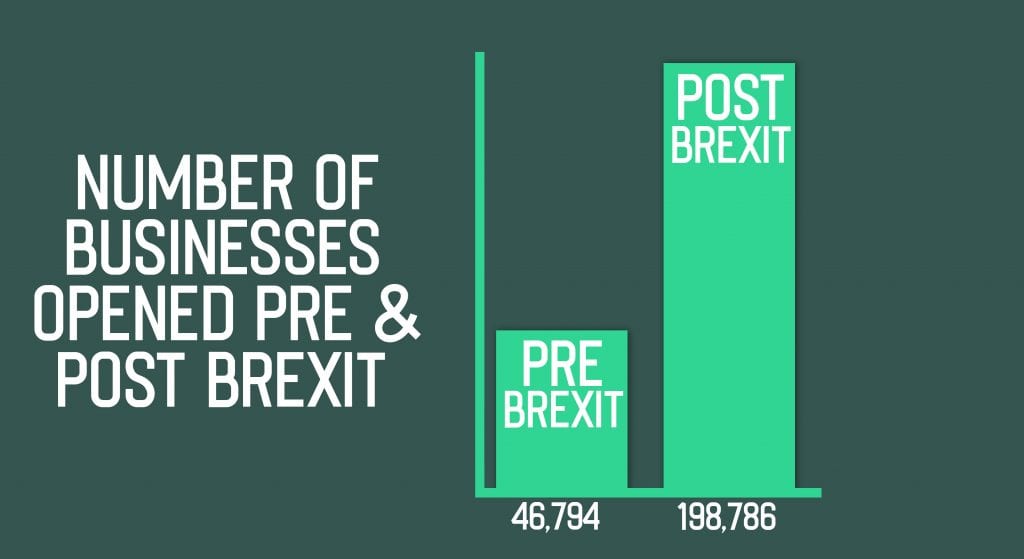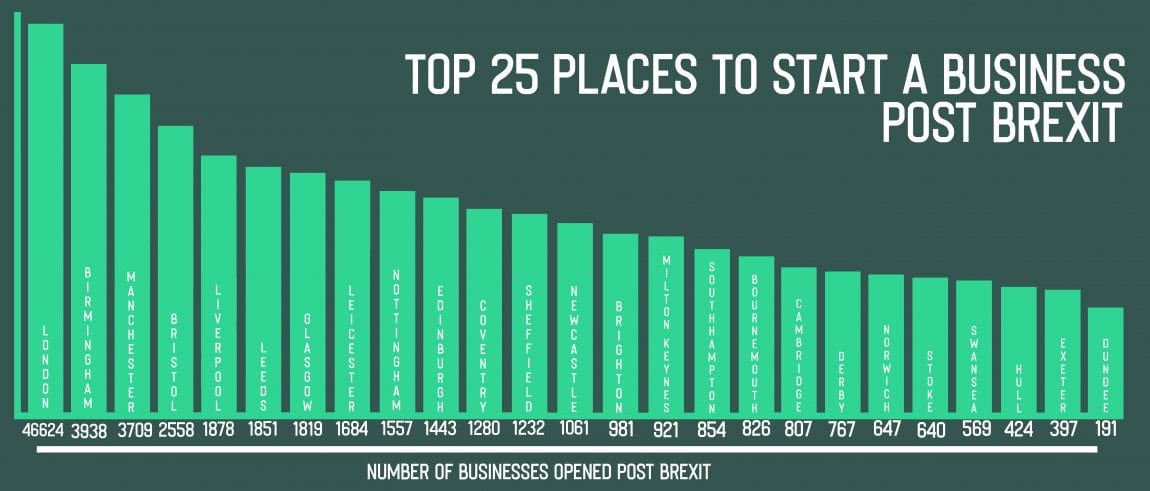Brexit was first announced on 23rd June 2016, leaving entrepreneurs and business owners fearing for the worst. We at AskTraders decided to conduct some in depth analysis on Companies House Data to find out the true impact Brexit has had on start-ups in the UK.
Start-up businesses unphased by Brexit
Despite there being so much uncertainty surrounding the referendum, 198,786 new businesses have been registered post Brexit – with 16,756 of those businesses registered that same year.
This figure rose to 46,353 in 2017, 80,156 in 2018, and 55,521 businesses recorded so far in 2019. However, within the same time frame pre brexit, just 46,794 businesses were registered in the UK – that totals an incredible 325% increase!
 325% increase – number of businesses opened pre and post Brexit.
325% increase – number of businesses opened pre and post Brexit.
London is the best city to start a post-Brexit business
When looking at the most popular place to set up a business in the UK, it’s no surprise that London comes up top, with a staggering 46,624 businesses being registered over the last three years. Birmingham comes in second with 3,938 and is closely followed by Manchester with 3,709 businesses.
 The top 25 cities to launch a business in post-Brexit.
The top 25 cities to launch a business in post-Brexit.
 The top 25 cities to launch a business in post-Brexit.
The top 25 cities to launch a business in post-Brexit.
Number of Private Limited Company businesses soar
Of the number of businesses recorded post-referendum, 192,148 of them fall within the Private Limited Company category – making this the most popular business category.
A Private Limited Company is a company which is privately held for small businesses. The liability of the members of a Private Limited Company is limited to the amount of shares respectively held by them and those shares cannot be publicly traded.
So what happens if there is a no-deal Brexit?
There is an imminent risk of the UK leaving the EU on the planned Brexit date of 31st October 2019, with no-withdrawal agreement in place.
With a no-deal Brexit, the UK will take on a “third country” status in the eyes of the EU.
In short, this means that the UK would be treated the same as countries that lack any free trade agreements for tax, customs and the movement of goods and people within the EU.
If this is the case then there will not be a transition period and significant changes for UK businesses will be required immediately as of 1st November 2019.
Given that so many businesses have been registered since the referendum, will Brexit really deter entrepreneurs and business owners?
Comment from Steve Miley, Senior Market Analyst at AskTraders, said:
“What we are seeing here is a significant increase in companies, most likely from Europe, setting up in the UK. In other words, European firms looking to get a foothold in the UK prior to the UK leaving the EU. With so many uncertainties surrounding Brexit, the possible terms of Brexit and how business will be conducted between the UK and the EU after Brexit, setting up a company in the UK could be one way to reduce uncertainties”.
Sources and methodology:
Companies house data – Used to collect individual company incorporation data, by year, type of business and city registered
Business demography, UK: 2017 – Change in the number of UK businesses broken down by sector of the economy.
N.B: Data from “Companies house data” is based on
Pre- brexit period: 23rd April 2013 – 23 June 2016
Post-brexit period: 23rd June 2016 – 23 August 2019
